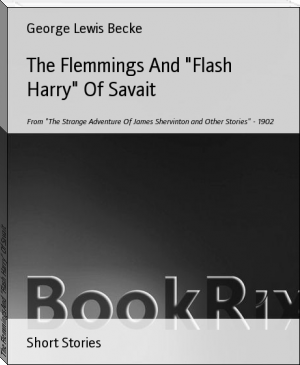The Flemmings And "Flash Harry" Of Savait - George Lewis Becke (ebook reader ink .TXT) 📗

- Author: George Lewis Becke
Book online «The Flemmings And "Flash Harry" Of Savait - George Lewis Becke (ebook reader ink .TXT) 📗». Author George Lewis Becke
At the end of another long weary year of hopeful expectation, he received replies from the Consuls, returning the money he had sent, and saying that after most careful inquiries, they could learn nothing of the nine men; but that they (the Consuls) had strong reason to believe that the schooner to which they had been transferred was a notorious German "blackbirder" named the _Samoa_, though the captain and the crew swore they knew nothing of the matter.
"It is quite possible," they said in their joint report, "that some or all of the men are on one of the German plantations in Samoa or Tonga, and that you will yet discover them. But the German Consuls will give us no assistance, and absolutely decline to permit us to send any one to visit the plantations, unless the managers or owners are agreeable. And, as you can imagine, the owners and managers are _not_ agreeable, and have declined in terms of great rudeness to even supply us with the names of any of their labourers, or the names of the various islands from which they come."
But even in face of this Flemming did not despair, and told his wife and children, who could not restrain their tears when they read the Consuls' report, that he would not let the matter rest. He had several friends in Samoa and Fiji--merchants, traders and ship captains, and to them he wrote asking them to institute enquiries quietly, and let him know the result.
After spending another five years on Anaa, during which time he had heard nothing of the missing men, he determined to settle on Rarotonga, where there was an excellent opportunity of making money. His eldest boy by this time was almost a grown man, and was earning his living as a supercargo of a trading vessel, running between Auckland in New Zealand and the various groups of islands in the South Pacific.
CHAPTER IV
In the quiet little harbour of Mulifanua, situated at the western end of the island of Upolu, a fine-looking brigantine was lying at anchor, and the captain and supercargo were pacing the deck together enjoying their after-breakfast pipes.
The brigantine was the _Maori Maid_ of Auckland, Captain Heselton, and the supercargo was young Robert Flemming. The vessel had run into Mulifanua Harbour owing to her having struck on a reef a few days previously whilst beating up against the south-east trades from Wallis Island to Leone Bay, a port on the island of Tutuila, one of the Samoan Group, and as she was leaking rather seriously her captain decided to run into Mulifanua, put her on the beach, and get at the leak or leaks.
"There is no need for you to stay on board, Bob," said Heselton presently to his young supercargo. "Go ashore and stay ashore until we are ready for sea again. All going well we'll find out where the damage is by this time to-morrow, and be afloat again in a few days. But there is nothing to keep you aboard, and you might as well put in your time shooting or otherwise enjoying yourself; why not go and have a look at Goddeffroy's big plantation? It's only about a couple of miles away."
"Thank you, captain, I think I shall. As you know for years past I have always been hoping that during one of our cruises, I might come across some native or other on one of these plantations who might be able to tell me something about those four poor fellows who were collared by that Peruvian barque ten years ago. And this plantation of Goddeffroy's is one of the biggest in the South Seas--there are over seven hundred labourers, Line Islanders, Solomon Islanders, New Britain niggers and heaven knows what else."
"Well, you'll have a good chance now. And look here, Bob--take your time, a day or two more or less doesn't matter to us. I shall have plenty to do even after I get at this confounded leak. The rigging wants setting up badly, so we may be here any time under a week."
"Right. I'll go and have a look at the plantation; and if the manager is a decent sort of a Dutchman he might put me up. If he's a hog--which he probably is--I'll go to the native village, sleep there to-night and have a day's pigeon-shooting to-morrow."
Just then a boat was seen putting off from the shore, manned by Samoans, but steered by a white man, who as soon as he came on deck introduced himself as the local trader. He was a quiet, good-natured old fellow--an Englishman--and as soon as he learned of the mishap to the brigantine, at once offered to get a gang of natives to assist in beaching her; and then pressed Flemming to make his house his home during the stay of the vessel.
"Thank you," replied the young man, "I shall be very pleased. I want to have a look at the big plantation here and try to have a yarn with some of the Eingsmill Island labourers." Then he told the trader, who was much interested, the object he had in view.
"I'm sure that the manager will let you talk to any of the labourers," he said, "for he's one of the 'White men' kind of Dutchmen. His name is Knorr. He succeeded a regular brute of a man who used to flog the plantation hands right and left. A lot of them have run away during the past six or seven years and have taken to the mountains. They are all armed, and sometimes, when they are in want of food, will lay the Samoan villages under tribute, and if any resistance is shown, they set fire to the houses. The Samoans are terribly afraid of them, for there are two or three cannibal Solomon Islanders among them, and a Samoan has a holy terror of a man-eater."
"Why don't the Dutchmen capture the beggars?" asked the captain. "There are enough of them in Samoa."
The old trader laughed--"Ay, too many, sir; too many for us poor English traders. But they have tried, time and time again, to capture these fellows, but only got badly mauled in two or three fights. There is a standing reward of two hundred dollars for every one of them, dead or alive, and about a year ago ten flash young Samoan _manaias_{*} set out, well armed and well primed with grog, to surprise the escapees, who were known to be living in an almost inaccessible part of the mountains. Only four of the ten came back; the other six were shot down one by one as they were climbing the side of a mountain, and these four were made prisoners by the outlaws, who gave them such a fright that they will never get over it. It was as good as any novel to hear them talk about it, I can assure you."
* Warriors or rather would-be warriors--young men whom the
local white men usually speak of as "bucks,"--i.e., flashy,
saucy fellows.
"Go on, tell us the whole yarn," said the skipper of the _Maori Maid_, as he pushed a decanter of brandy towards his visitor, and take a cigar. "It's pleasant to meet an Englishman in these Dutchman-infested islands, especially when he has a good yarn to spin."
"The yarn isn't a pleasant one, captain," said the trader. "It's a d------d unpleasant one, but it's true, sir."
He lit a cigar and then resumed: "Well, after six of these flash young fellows were shot down, the other four dropped their rifles and cried out, _Fia ola! Fia ola!_ (Quarter! Quarter!) and in a few minutes about a dozen of the escapees made their appearance, took away their rifles and cartridges, and tying their arms behind their backs made them march in front of them up the mountain-side till they came to a bit of a thicket in which were four or five small huts. Telling their prisoners to sit down, half of their number went away, returning in half an hour with the six heads of the men who had been shot.
"Take these heads back with you," said one of the outlaws, who could speak Samoan, "and tell all Mulifanua that we are strong men. We fear no one, for we have plenty of guns and cartridges, and five hundred men such as you cannot take us. And say to the chief of the village, that on every fourth day, food for us must be brought to the foot of the eastern spur of the mountain. If this be not done, then shall we kill all whom we meet--men, women or children. Now go and tell the man who flogged us that some day we shall cook and eat his head, for we are very strong men.'
"Well, the four poor trembling beggars were liberated, and carrying the six heads of their comrades, they went back, and their story so terrified the people of Mulifanua that no further attempt was ever made to capture the outlaws. And although the Germans don't know of it, the villagers are to this very day, gentlemen, supplying these dangerous devils with food, and I know for a fact that sometimes two or three of them come down from the mountains and sleep in the village without fear. They have never troubled me; but very often a native boy or girl will come to me and buy a 28-lb. bag of shot, caps and powder, and I know perfectly well that it is for the 'wild men,' as the people here call the escaped men. Every one of them has not only a rifle, but a shot-gun as well, for they one night broke into the plantation store and carried off all the rifles and guns they could find."
"Take care, Bob, that they don't take some pot shots at you," said the captain, with a laugh, as his supercargo rose to get ready to go ashore with the trader.
"They would if they thought Mr. Hemming was a German from the plantation," said the trader, seriously, "so you had better not go too far away when you are shooting, unless you take a native guide with you. For, as I have said before, these men and the people of the village are now, I really believe, in secret friendship, or rather alliance--an alliance born out of terror on one side and savage desperation on the other."
A few minutes later young Flemming and the trader were being pulled ashore.
CHAPTER V
The German manager of the great plantation proved to be, as the old trader had said, "one of the white-men kind of Dutchmen." He received the young supercargo most hospitably, and insisted upon his remaining to lunch, and when Flemming told him frankly of the long quest for the four missing men, he at once became deeply sympathetic.
"You shall see every one of the six or seven hundred natives I have working for me, Mr. Flemming. They are all now scattered about in different portions of the plantation, but at five o'clock, when they knock off, I shall have them all mustered. But I am almost certain that you will not find any one of the nine who were transferred from the Peruvian slaver to the German 'black-birder,' for I have always taken an interest in these people, and know pretty well from where they all come. My predecessor here was very rough with them--the less I say about him the better--and there is now quite a number of runaways living in the bush. They have defied all efforts





Comments (0)